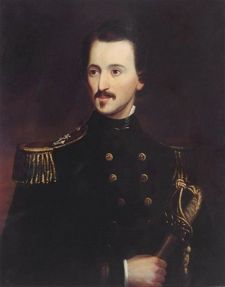Melancthon Brooks Woolsey
Melancthon Brooks Woolsey (August 11, 1817 – October 2, 1874) was an officer in the United States Navy during the Civil War.
| Melanchton B. Woolsey | |
|---|---|
| Born | August 11, 1817 Sackett's Harbor, New York |
| Died | October 2, 1874 Pensacola |
| Occupation | Navy officer |
Woolsey, the son of Commodore Melancthon Taylor Woolsey, was born at Sackett's Harbor, New York. He entered the Navy as a midshipman on September 24, 1832. After duty at sea and a tour at the Naval School, Woolsey became a passed midshipman on July 16, 1840. He progressed through the rank of master to that of lieutenant by 1847. It was in that rank that he was placed on the reserve list by the retiring board in September 1855. Lt. Woolsey returned to active duty in 1861 as a result of the Civil War.
Assigned initially to the receiving ship at New York, Woolsey had assumed command of the steamer Ellen by late 1861 and began patrol duty with the South Atlantic Blockading Squadron. During that tour, his ship fought Confederate forces on three separate occasions. In May 1862, he engaged Fort Pemberton at Wapper Creek, South Carolina. On June 1, his ship repelled a Confederate cavalry attack at Secessionville. Three days later, he commanded Ellen during the attack on James Island.
In July 1862, he was promoted to commander and placed in command of the sloop Vandalia. That duty lasted until early 1863, at which time he was transferred to command of the steamer Princess Royal. That ship was assigned to the West Gulf Blockading Squadron and patrolled the coasts of Louisiana and Texas. On June 28, 1863, Princess Royal helped to defend the town of Donaldsville, Louisiana, against a determined Southern attack, and Comdr. Woolsey received high commendation from his superiors for his ship's contribution to the successful defense of the town. He remained with the blockade through the end of the war and, by July 1866, saw his name returned to the active list in the rank of captain.
Following the Civil War, Capt. Woolsey commanded the sloop-of-war Pawnee on the South Atlantic Station in 1867 and 1868. In 1869, he took command of the South Atlantic Station flagship Guerriere. In 1871, Woolsey was promoted to commodore, probably as flag officer in charge of the South Atlantic Station. His last tour of duty came in March 1873, when he took over as commandant of the Pensacola Navy Yard. Commodore Woolsey received orders detaching him from command of the navy yard in the summer of 1874. At the time, an epidemic of yellow fever raged at Pensacola, and Woolsey deemed it necessary to remain at his post to prevent panic. As a result of his devotion to duty, Commodore Woolsey contracted the disease and died at his home in Quarters A.
The first USS Woolsey (Destroyer No. 77) was named in honor of his father, Commodore Melancthon Taylor Woolsey, and the second USS Woolsey (DD-437) commemorated both him and his father
